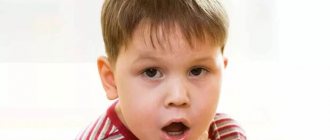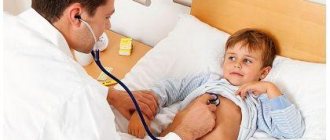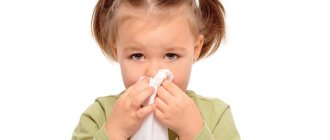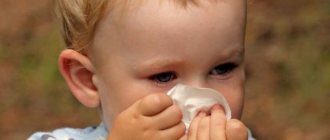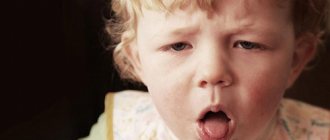A characteristic sign of colds is cough and nasal congestion, and the appearance of such symptoms in a sick child is not a surprise to parents. All doubts completely disappear when the baby’s body temperature rises. Parents are perplexed and concerned about a common cough, which can continue in children for a long time and is not accompanied by fever, cough, or nasal congestion.
Cough is a kind of protective reaction of the body, thanks to which the tracheobronchial tree is kept perfectly clean and safe, because it blocks the entry of various irritating substances. Physiological exhalation or cough is accompanied by natural contraction of the respiratory muscles and mechanical barriers are created to prevent foreign bodies from entering the respiratory tract. This process is absolutely normal for a healthy person and does not cause any particular concern, of course, if it does not concern a small child.
Possible reasons
The main causes of cough without fever can be considered:
- First of all, these are acute respiratory infections.
- Chronic respiratory diseases such as bronchitis, tracheitis and others.
- Diseases of the nasopharynx: sinusitis, adenoiditis can occur with the process of expectoration. This happens when mucus gets into the throat. Most often this happens at night, when the patient is lying down for a long time.
- A dry cough can also be a sign of tuberculosis.
- Allergies and bronchial asthma are also accompanied by an annoying cough.
Causes of cough without runny nose and fever
When a high temperature rises, this indicates pathogenic organisms that caused the disease. Doctors say that if there is no runny nose, fever, or a person has a weakened immune system, it will be difficult for him to overcome the disease. In some situations, fever accompanies a cough if it is of a bacterial or infectious nature.
Often such symptoms are characteristic of allergies, with a dry cough bothering you for a long time, a swollen nose, and sometimes clear discharge may appear from the nose.
Cough can be caused by smoking. Nicotine irritates the mucous membrane of the throat, bronchi, and trachea. Medicine has recorded cases of cough without fever in children with bird flu.
Also often, a cough without fever or a runny nose can be a symptom that there is a foreign body in the respiratory tract. The child has been bothered by a strong dry cough for a long time; it may not go away for a long time; drug treatment does not help. The child feels better only when the foreign body is pulled out from the throat area.
Independent determination of reasons
After the child develops a cough, measure the child’s body temperature. If the body temperature is normal, be sure to check the conditions in which it is located:
- determine the humidity in the room;
- make sure there is no mold in the room;
- eliminate the presence of foreign odors (chemicals).
If the causes that could cause the cough are not found, consult a doctor. A child's cough without fever or runny nose is not uncommon.
Associated symptoms
When there is no fever, but there is coughing that continues for a long time, other symptoms may occur against this background. For example, snot, muscle pain, dizziness, weakness - confirm doctors’ fears regarding the development of various diseases.
Weakness
When the body is exposed to negative influences from pathogens, the immune system begins to work harder. Because of this, people who are engaged in their usual activities, do not comply with bed rest, and feel weak. This is due to the fact that energy is spent on daily activities and fighting the disease.
Weakness
Sneezing
Sneezing can occur several times a day. This is the body’s protective reaction to foreign bodies entering the upper respiratory tract. Sharp contractions allow you to get rid of mucus, pus, dust particles, and debris.
Headache
Headaches localized in the temples, forehead, and back of the head often accompany various diseases. Painful sensations can be languid, aching or sharp. Pain localized in the forehead and temples indicates increased pressure.
Diarrhea
Stool disorders often appear with the development of bacterial and viral diseases. Diarrhea may be caused by improper medication use. To improve the condition, it is necessary to take medications that restore the microflora of the stomach and drink more fluids.
A sore throat
Many colds are accompanied by a sore throat. For example, laryngitis may be accompanied by hoarseness and complete loss of voice. If the doctor sees a red throat, he prescribes a number of gargles.
What is taken in such cases
Only a pediatrician can determine the cause and write a referral to a specialist. What is assigned in this case:
- medications that suppress the urge to cough;
- drugs that help thin sputum;
- healing herbs;
- drugs that help with sputum removal (mucolytic drugs);
- physiotherapeutic procedures: baths, inhalations, warming, rubbing;
- maintaining the required level of humidity and access to fresh air in the apartment.
Hospitalization should not be refused if the child begins vomiting, complains of pain, difficulty breathing, coughing at night does not allow him to sleep, and becomes more frequent at night. During the course of the disease, children may also develop conjunctivitis, since the patient's immunity is reduced.
Dry cough without fever: treatment
A rare dry cough or a prolonged cough causes a lot of discomfort and pain. For this symptom to become productive, special medications are needed that will contribute to recovery.
Effective for expectoration of sputum: Gerbion, Sinekod, Codelac Fito, Bronholitin. It is important that the medicine is prescribed by a doctor, since an incorrectly selected drug can cause stagnation of phlegm in the lungs.
Syrups for this symptom are effective even at the first signs of a cold. This alleviates the baby’s condition, reduces pain and has antitussive, anti-inflammatory, antibacterial and expectorant effects. Natural components have an effective effect on the child’s body and have no contraindications, unless individual intolerance is excluded.
Compresses, mustard plasters, inhalations, and rubbing ointments into the chest will also be effective.
A prolonged cough, barking, that is accompanied by longer than 3 weeks is a reason to identify the causes of the symptom. The doctor should prescribe a medicine that will help the baby; it should suppress the cough reflex, that is, affect it at the level of the brain.
Some drugs cannot be prescribed because they are too strong - Codeine, Morphine. These are narcotic substances that are addictive, so they can only be prescribed to adults for a maximum of 7 days.
The most commonly used tablets for children are: Butamirate, Libexin and others. After a course of treatment with antitussive drugs, it is necessary to change tactics by prescribing other drugs depending on the symptoms.
Prevention of such diseases
After the child recovers, preventive measures should be taken to try to prevent health problems in children:
- Personal hygiene will help avoid infection through household methods (washing hands after walking).
- Do not contact with sick people.
- Ensure regular ventilation of rooms and humidification of the air.
- Do not allow smoking around the child.
- Drink enough water.
- Provide a balanced diet to boost immunity.
- Under no circumstances should you give up walking, of course, if you feel well.
When a cough without symptoms is normal
Coughing, by its nature, is the body’s way of protecting itself from factors unfavorable to it. Moreover, it is not at all necessary that this is a pathological process.
Cough without fever or other symptoms in children can manifest itself in several cases:
- In the nursery or other room where the child is, the air is very dry. It irritates the throat, causing a sore throat;
- Foreign body in the nasopharynx or trachea. When eating, crumbs and pieces of food may enter the respiratory system, irritating the mucous membranes, which provokes muscle contraction. Prolonged exposure to dusty conditions can also have an irritating effect;
- Stress and worries. Young children can react in a similar way to various stressful situations (change of place of residence, change in daily routine, entering kindergarten or school, parental divorce, etc.).
Such cases do not require drug treatment; the cause must be eliminated. If the cough was provoked by a psychological factor, you may need to consult a child psychologist.
Allergic cough
Having determined that a child has a cough without a runny nose or fever, the local pediatrician may refer you for a consultation with an allergist. If your child is about 6 years old and suffers from diathesis, then the most common cause of an annoying cough is an allergic reaction. Signs of this type of cough: attacks appear in the presence of certain irritants. These could be dogs, cats or plants. Another sign is a healthy body temperature and no runny nose, but a barking cough. Worries more often at night. This type of cough cannot be left untreated; it can develop into bronchial asthma. What can you do in this case:
- the first step is to see a doctor;
- further determine the allergen to which your child is sensitive;
- provide a safe environment for the patient without allergens;
- taking medications;
- increasing immunity.
Be attentive to the health status of your children. This will help them avoid many diseases.
How to stop coughing at night?
If you can cope with the disease during the day, it is possible to monitor the child and help him, then at night parents have to stay awake, especially if the symptom is complex.
During a night attack, give your baby warm milk or tea. Next, you need to change your body position - walk a little, move around, which will improve the discharge of sputum.
You can give cough drops, for example, Doctor Mom. No matter how tired you are, make sure that the lollipop is completely dissolved in your baby’s mouth and that he doesn’t fall asleep with it.
To prevent another attack, keep the bedroom slightly cool and humid.
Inhalations for coughing in children aged 4 months
Regardless of body temperature, steam inhalations should not be given to children aged 4 months. A good result in the treatment of cough in children of this age is achieved by inhalation of saline solution, which is done using a nebulizer.
These devices effectively help in the treatment of inflammatory processes in both the upper and lower respiratory tracts. Breaking medicinal substances into microscopic particles, the device delivers them to the mucous membranes in the very accumulation of sputum.
The procedure can be performed twice a day, for 3-5 minutes, for five days. Inhalations are carried out in normal breathing mode. To increase the therapeutic effect, saline solution for inhalation can be mixed in a 1 to 1 ratio with medications:
- Lazolvan
; - ambrobene
; - fluimucil
.
Another advantage of inhalations is that, due to his age, the child is only able to take liquid products, so treating him at this age with tablets or powders is very inconvenient. This is where liquid syrups come to the rescue.
What diseases can cause cough
One of the possible causes of cough in the first months of a child’s life may be a cold or ARVI. The baby runs the risk of becoming infected from others through airborne droplets, and weakened immunity and hypothermia contribute to the development of the disease. In children of one month of age, as well as older babies, up to a year, colds are manifested not only by cough. They are a stuffy nose, snot (usually quite liquid and transparent), lethargy.
Often, due to a cough and runny nose, sleep is disturbed, possibly. ARVI needs to be treated before it becomes complicated by more serious diseases. First of all, it is necessary to consult a doctor on the selection of medications that are appropriate for the baby’s age.
.
Cough is also accompanied by the following independent diseases and complications of a cold:
- laryngitis - cough is dry and hoarse, painful;
- sinusitis (most often sinusitis). Along with a cough that gets worse at night, its characteristic symptom is the discharge of purulent snot;
- whooping cough is a severe infectious disease accompanied by a prolonged intense cough that lasts for months;
- , can develop both in a month-old baby and at a later age. It manifests itself first as a dry, then wet cough.
Another cause of cough that is not related to illness, but requires immediate action, is aspiration.
In children, foreign bodies, liquid or solid, quite often enter the respiratory tract. In addition to a strong painful cough, suffocation often develops in such situations. It is not always possible for a child to clear his throat on his own and get rid of a foreign object. If your baby begins to cough and begins to choke, you should immediately consult a doctor.
Some children suffer from reflux esophagitis, a pathology of the digestive system.
In this case, the baby begins to cough due to the fact that acidic, irritating stomach contents have entered the esophagus and throat. This problem occurs mainly when the baby is lying down. It requires examination and treatment, but not at all the same as for colds.
How to treat a cough in a 4-month-old child using folk remedies
When treating an infant with folk remedies, it is important not to harm the baby. Sometimes even the thought of treating a baby with chemicals causes panic in parents. They believe that it is too early for their baby to take medicine. In this case, wraps and rubbing will help cope with the cough.
The simplest and safest remedy is camphor oil.
. It acts as a mild warming and distracting agent. A small amount, about 1 tbsp. l., camphor oil is heated to + 37 degrees and lightly rubbed into the chest and back. After which the child is wrapped in a dry diaper and covered with a blanket. After 30 - 40 minutes, the baby needs to be changed into dry clothes and kept under the blanket for some more time.
A proven remedy for coughs that are difficult to treat is a curd compress
. For it you will need to take about 100 g of cottage cheese and 20 g of honey. The cottage cheese needs to be heated to +50 g in a water bath and honey added to it. Stir everything well and place on film. Apply from the back and chest, cover with a diaper on top. Keep the mixture for 40 - 50 minutes. The procedure can be performed 2 times a day for 5-6 days. The curd compress is completely safe for the baby. Honey cake also has a mild effect on coughs. It is not difficult to prepare it at home. It is enough to mix a few tablespoons of warm water with one spoon of honey and flour. From the resulting dough, form a cake to the size of the child’s back, cover it with a diaper and hold it for 40 - 50 minutes. If the child falls asleep during the procedure, the cake can be removed after waking up.
A cough in a baby should not be treated immediately with medications. The famous pediatrician Komarovsky recommends initially understanding the cause of the disease and taking all possible measures to eliminate it, without touching medications. It is possible that the factor influencing the development of coughing does not relate to pathological processes.
Speaking about the problem in infancy, it is worth immediately clarifying the type of cough that is considered natural, a normal reaction of the body. It occurs almost immediately after birth and goes away by 2 months of age. Such coughs become short, spontaneous in time, not accompanied by other symptoms.
The phenomenon occurs due to the adaptation of a new person in the environment. His respiratory system learns to reproduce inhalation, exhalation, respond to dust, humidity, temperature changes, etc. This coughing should absolutely not worry parents, cause severe discomfort, and be treated with medications. It can be recognized by the baby’s active behavior and unaltered state. If the newborn still sleeps well and eats, then there is no reason to worry.
What to do if your baby is coughing from colds and flu
One of the drugs that can be used to treat very young children, including newborns and premature babies with a gestational age of less than 34 weeks, is the antiviral drug VIFERON.
The drug VIFERON has a wide spectrum of antiviral activity. Alpha-2b interferon, which is part of the drug, was created on the basis of modern technologies. Antiviral properties allow it to block the reproduction of the virus, and the immunomodulatory effect helps restore immunity. The drug was developed as a result of fundamental research in the field of immunology, which proved that in the presence of antioxidants (vitamins C, E and others), the antiviral effect of interferon is enhanced.
For the treatment of children under one year old, the drug VIFERON is used in the form of suppositories and gel. The ointment is used to treat children over 1 year of age.
Children under 7 years old, incl. newborns and premature infants with a gestational age of more than 34 weeks are prescribed VIFERON Suppositories (suppositories) 150,000 IU, 1 suppository 2 times a day after 12 hours every day for 5 days. According to clinical indications, therapy can be continued. The break between courses is 5 days.
Premature newborns with a gestational age of less than 34 weeks are recommended to use the drug VIFERON 150,000 IU, 1 suppository 3 times a day after 8 hours every day for 5 days.
The article “Acute respiratory infections in children: optimization of treatment tactics” describes the results of a study of the use of the drug VIFERON in the treatment of ARVI and influenza.1 In the group consisting of children of different ages who received the drug, positive dynamics were observed: body temperature tended to normal, symptoms decreased intoxication, the intensity decreased until the cessation of catarrhal symptoms (cough, runny nose) and respiratory syndrome (difficulty breathing) on average two days earlier than in the control group. For children undergoing treatment in a hospital, nosocomial infection becomes a frequent problem and threat to delay treatment and complications of the underlying disease. It is important that among children who received VIFERON, infection occurred half as often.
Depending on the pediatrician’s recommendations, for the treatment of ARVI, it is necessary to apply a strip of VIFERON Gel approximately 0.5 cm long to the nasal mucosa 3-5 times a day for 5 days. Before this, it is better to rinse the mucous membrane with saline solution. In order to protect a child from ARVI, it is necessary to apply a strip of gel approximately 0.5 cm long to the nasal mucosa 2 times a day as a preventive measure. Course duration is 2-4 weeks.
Reference and information material
Author of the article
Gerasimenko Igor Olegovich
General doctor
Sources:
- Nikolaeva S.V., Khlypovka Yu.N., Gorelov A.V. Acute respiratory infections in children: optimization of treatment tactics. //RMJ 2019; 1(*): pp.1-5.
i https://cyberleninka.ru/
ii https://www.rmj.ru/
Loading...
Take other surveys


